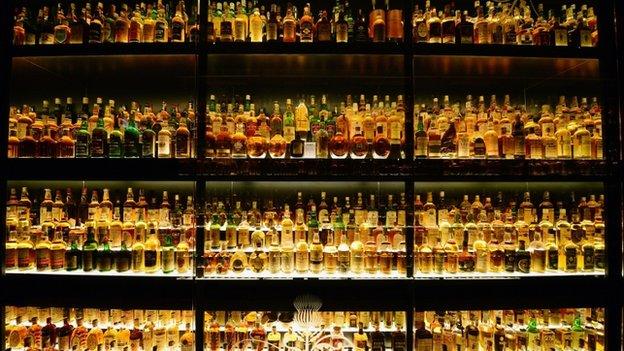Scotch loses its flavour
- Published
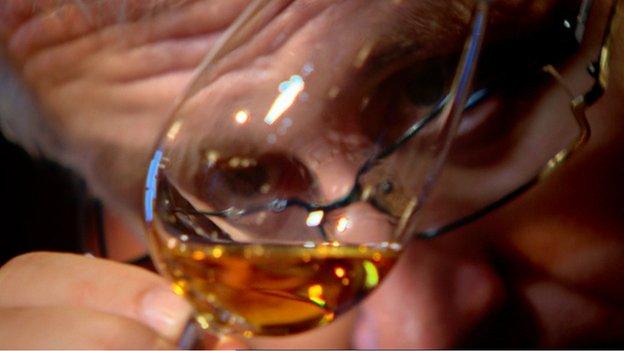
Douglas Fraser takes a close look at the economics of whisky
We have known for a while that Scotch whisky's stunning growth through the downturn years had slowed up. With Diageo's full-year results, we know better why that is.
Emerging markets have stalled, tastes are changing, the industry giant has stalled, and it's responding by turning its marketing attention to rival spirits.
The Diageo market proposition is quite simple, but its figures are not. The drinks giant produced a messy set of figures. They included elements of United Spirits, the giant of the Indian industry, taking control from Vijay Mallya during the last financial year.
The flamboyant Indian's accounts are now the subject of legal action, which in India can get messy and drawn out. Ask Cairn Energy, or Vodafone.
The scale of the Indian acquisition, in the world's biggest market for whisky, is clear from the 1700% rise in the company's sales there, the vast bulk of it "Indian-made foreign liquor", while like-for-like growth of imported booze was only 3%. That translated to £921m extra in net sales, a rise of nearly 9% in the global total.
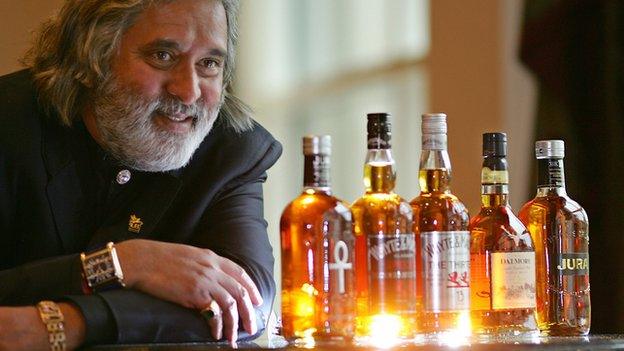
Diageo has taken control of Vijay Mallya's United Spirits
The other big messy factor was in currency fluctuations, which are a feature of this season of corporate reporting.
Particularly in Russia and Venezuela, big currency movements worked against Diageo. The total cost for the year was £337m to the bad. It meant the sterling value of sales to Russia and eastern Europe was down 26%.
There was modest improvement from selling premium brand spirits, up by £123m.
But that was more than offset by a decline in volumes of bottles sold.
That was because shipments to the US were lower, as wholesalers de-stock, and as the Securities and Exchange Commission (the Wall Street regulator) inquires into whether Diageo's previous reporting of shipments had been misleading and therefore broke US law.
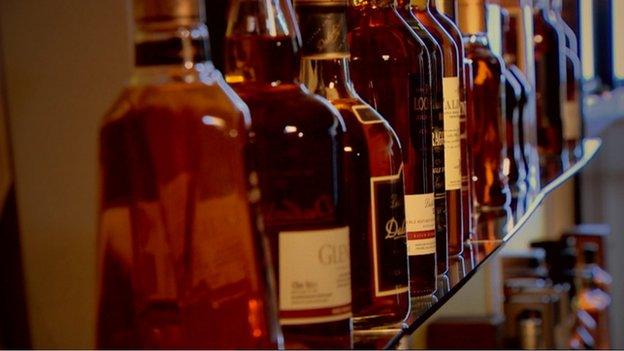
The end result was a 5% rise in total Diageo sales, almost entirely made up of the growth from the Indian acquisition. Without it, sales were flat - and for a second year.
China down
Within that, Scotch whisky has lost its leading role in driving Diageo's sales. As Diageo has two-fifths of the industry in Scotland, that matters a lot.
Perhaps it's because it was growing in the wrong places. Venezuela's economy has tanked. Diageo's production of local spirit there was hampered by getting sufficient supplies of glass for bottles.
There was slowdown in Brazil, where there was tough price competition for Johnnie Walker, down 9%. As with Venezuela and Brazil, Turkey turned from Scotch to locally-distilled drinks when the price of imports made them less attractive.
The official disapproval of extravagant hospitality in China has also slowed things up. Prestige bars with prestige drinks have become less prestigious.
Diageo's marketing spend makes a big difference to the fortunes of its brands. Growth of more than 50% in East African sales of Scotch was driven by marketing.
But it has taken its foot off the pedal with promotion of Scotch in China. Scotch was down 17%, though the Singleton and the new Haig Club (the oddly-shaped blue bottle promoted by David Beckham) was on the rise.
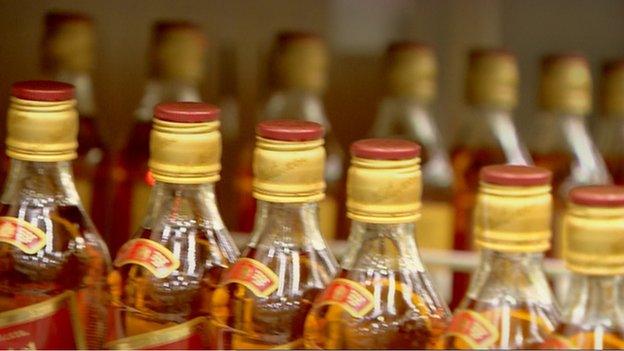
The Singleton was also strengthened in Taiwan, where it has become the leading single malt. And on the mainland, Diageo's growth has come to focus more on the company's traditional Chinese distilled spirit, Shui jing fang.
Core market
Among the brighter spots for Scotch was Mexico, up 15%. And France, the industry's biggest export market by volume, registered a modest growth in Diageo sales, led by whisky, and with single malts up 6%.
Single malts were also growing in the US. Buchanan's led the way, up 20%. Well established in Central and Latin American markets, that has translated to a loyalty to the brand among Hispanic Americans.
But marketing spend was down on Johnnie Walker, following a stronger push in 2013. Net US sales in the leading Scotch brand were down 15%.
The alarm bells for Scotch should be ringing ever louder when the industry looks at the growth of US whiskey.
Not only are micro-distilleries pushing into the market beside US micro-breweries, but Diageo has a range of domestic spirits that are growing much faster.
Scotch delivers 24% of Diageo's business, and North American whiskey represents 7%. Whisky declined 5% worldwide, but its trans-Atlantic rivals rose 12%.
And the biggest success story was with the launch of a version of Crown Royal, flavoured with apple. It's not the only flavoured whiskey that's growing market share rapidly.
The Scotch industry may have to make a move in that direction. But as traditionalists will surely tell you, it'll have to do so carefully.
- Published29 January 2015
